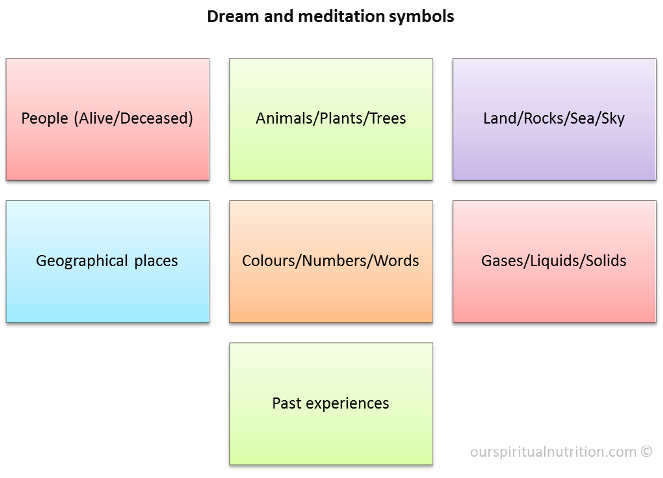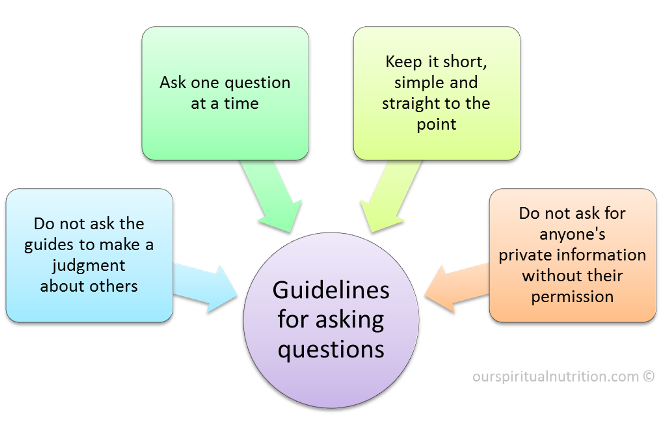About this page
Android phone - Tap More. Select Find in page
Android tablet - Select menu in top right, select Find on page
iPhone or iPad, Chrome - Tap More. Find in Page
Mac - Command+F
Safari with iPhone - Tap Share icon, scroll to Find on page
Windows PC, Chromebook, Linux - Ctrl+F
Meditation and dreams
How the guides communicate with us
Figure 15: What our thoughts can sound like
Figure 16: Dream and meditation symbols
Other methods the guides may use to communicate with us
How can I be sure I'm receiving Universal Truth?
Stumbling blocks
Ask questions
Figure 17: Guidelines for asking questions
Sample questions
Be alert
Meditation and the fine art of asking questions
Figure 18: Epiphany
Next steps
Self-test
Meditation and dreams
Meditation or "Going Home" takes us into a world with much more meaning than we might ever have imagined. We become a conscious participant in our own spiritual development. One of the first things to notice is the images and phrases that appear in our thoughts, in dreams and meditation and even in everyday life. It may seem as though this is something new, but it really is not. We all receive communication, but we seldom take time to pay attention. Going Home helps us to slow down and listen, and to become more adept at recalling our thoughts. This might seem like a lot of work, but paying attention to our thoughts builds self-worth and self-acceptance, along with a healthy new pattern of working toward self-improvement.
In the early stages of practicing Going Home, the guides help us to hear our thoughts so that we can learn what we are creating in our lives. Learning new belief systems that are based in Universal Truth enables us to resolve our inner conflicts, and then release old patterns that keep us stuck repeating negative life experiences, also known as being “lost in the playground'.
How the guides communicate with us
Our guides communicate with us telepathically, with pictures or words, or with physical signals that symbolize the areas of our lives needing attention. Why? For them to simply tell us that we are doing something "wrong" would be judgment on their part. This would violate the spiritual Law of Free Will, with which they are obliged to comply.
The guides have an uncanny way of bringing the right people, places and things to our attention, to inspire us to ask questions. For example, having a dream about our earthly mother might be used to show us that we are acting as she might. Perhaps we have taken on one of her negative behaviours and it is causing turmoil in our lives. Until we recognize it though, we cannot change it. Once we know it is within us, we can find and resolve the underlying issue causing us to repeat the pattern.
Food for thought
My mother would withhold communication completely from me if I did something that annoyed or displeased her (see
cold shoulder treatment. This is a very effective form of manipulation as it can cause us to feel guilty. Of course I learned to do it too, and it crippled my ability to have healthy relationships. The pattern hurts others, but it also hurts us. It freezes our thought process, preventing us from saying how we feel. The Universe provided me with several clues in dreams and in meditation to help me see (a) that I was doing it, (b) that it was hurtful, and (c) that change is possible. Changing the pattern meant struggling through the learning curve of healthy self-expression. Easy? No. Worth the effort? Absolutely.
This is how our thoughts can sound when we pay attention to ourselves:
Figure 15: What our thoughts can sound like
The guides use symbolism that can take many forms. Colours, numbers, images of people we know, animals - everything we experience in life - can be used to teach us about ourselves, anytime of day or night. Check out the spiritual meanings of colours, numbers and symbols.
Figure 16: Dream and meditation symbols
Other methods the guides may use to communicate with us
They may make a play on words. For example: A dream might highlight the wallpaper in a room, with the important part being where the wallpaper meets the 'ceiling'. The message? “See (the) link”. A car might be shown - a Lincoln Continental...same message. Both of these ‘link’ dreams are aimed to help us see the link between things that we might not consider to be connected. We may think that our behaviour is not at all like someone else’s, yet in fact we may be doing the exact same thing.
If we are shown the face of someone we know or knew, we can ask our guide what this person is meant to represent. Our earthly mother can represent the old days, the old ways or old-fashioned concepts, or the idea of nurturing. Our earthly father can represent some aspect of the relationship that we have (or had), but might also represent our heavenly Father (Universal Intelligence). The image of a family member might mean that there is a relationship in some area of our life that is unrecognized or misunderstood, or it could mean that we, or someone around us, is behaving in a manner that is like (or unlike) that relative.
The guides often use pictures of books, computers, televisions and telephones to show us that communication is required. Then we would ask what issue needs to be discussed, and with whom. They may repeat a few lines from a song over and over in our thoughts. Although the words may seem self-explanatory, we need to make sure by asking.
Our guide may repeat a person's name or a particular phrase over and over until the correct questions are asked. "What am I doing that is like or unlike this person's behaviour?" is a good place to start. With the vast number of possible interpretations, it is easy to see the importance of asking questions of our guide and listening for the answers.
How can I be sure I'm receiving Universal Truth?
Our guide will tell us exactly what we believe (see Free Will) unless we specifically ask for Universal Truth rather than for what we want, expect or fear to hear, so we must ask questions designed to allow our guide to give us new information. After all, if they tell us what we already know or believe, how can we grow or change?
The more questions we can ask, the better. We must be willing to acknowledge that we may have preconceived ideas or belief systems, even if we do not know exactly what they may be, and we must be willing to set them aside. We must be truly willing to confront a Truth about ourselves, our loved ones or our experiences that may not be agree with what we have been taught or what we may want to believe.
Stumbling blocks
Some belief systems can actually prevent our guide from answering us. If we ask a question and no answer comes, there may be a belief system in the way - could be something like:
Beliefs like this can be worked around by persevering with practicing meditation. After all, what does giving up achieve? Rest assured that there is definitely someone there, you are worthy and you are capable. It just takes practice and determination.
Ask questions
Even if we think we know the meaning of a dream or meditation image, our guide may well have wrapped another, more important message within it. As long as we believe that we understand the symbol fully, our guide has no choice but to agree. We must have the intention to look for it. Ask simple, straightforward questions. It is best not to seek information that would invade anyone's privacy, and it is best not to ask the guides to make a judgment about anyone. If your question does not receive an answer, ask your guide for the reason and listen closely to your thoughts for the answer.
Figure 17: Guidelines for asking questions
Sample questions
Here are a few sample questions to help find the Universal meaning of our dreams. Until our guide says we have gained the necessary understanding, we will know to keep asking questions. Ask one question at a time and pay close attention to your thoughts for at least 10 to 15 seconds for the answer before moving on. (Answers to more complicated questions may come over a period of time, maybe even over the space of a few days.)
Be alert
By remembering consciously the questions we have asked our guide, we begin to see the answers presented all around us as we go about our lives. This process provides epiphanies and brings spiritual enlightenment. We will find that which we seek. Even if we forget that we have asked to be shown something, our guide can remind us (somehow) to be alert when something important is happening. We can then ask questions to find out what is needed. Awareness of our personal environment can reveal new levels of information. Note that our daily experiences are used to teach us. Television programs, relationships of the people around us - at work, at school, at play - can show us new areas about ourselves to examine.
If our guide communicates with us in a way that seems rude or cruel, it is to help us see how we treat others or ourselves. That which we hate most in others is often within us, but when we are dedicated to improving ourselves, our guides will persist until we get the message. Once we know what we are doing, we can begin to change the pattern.
Since the guides work only with unconditional love, there is no possibility that they are acting out of spite or revenge, or any other negative purpose. They hope that we will begin to ask questions. Try asking:
Food for thought
A friend was out driving in her car when she was guided to, “Turn left here, Turkey”. She told me about it laughing and said, “That’s just what I would say!” That is precisely the point. Her guide was reflecting my friend’s own behaviour for her to see, and, hopefully, modify. Of course, if we see nothing wrong in name-calling, then the first thing to change is our attitude. The Universal Intelligence calls this judgment, criticism, and condemnation though, and if we choose to change the habit, assistance will be given.
Meditation and the fine art of asking questions
Problem
Many people give up on meditating, claiming that they never receive answers to their questions. While that is one possibility, there are others.
Analysis
Solution
Think like a reporter and consider exactly what information you want. The W5&H method - Who, What, When, Where, Why and How - can be helpful. Write out or type your questions beforehand. Use as few words as possible, using simple, clear phrasing. Ask one question at a time and wait for the answer before moving on to the next question.
We often we make statements and then wait for the Universe to agree or disagree with us, so be sure to ask an actual question.
Be sure to Go Home before asking your question. Ask your question out loud and then immediately pay attention to your thoughts - as if you were listening for another person to answer. Epiphanies will come with practice and perseverance. Check out WikiHow's How to ask better questions
Next steps
It is important to gain a basic understanding of colours, numbers and symbols because the guides use them to communicate with us in dreams, in meditation and in everyday life.
Self-test
Click buttons to show or hide content...
⇐ Section 3
Section 5 ⇒
Section 4
Section 4-1 - Ground rules
Section 4-2 - Colours
Section 4-3 - Numbers
Section 4-4 - Symbols
|
Got questions, comments or suggestions? |
Cookies
This site uses Statcounter web analytics to track statistics using a 3rd party analytics cookie. No personal information is stored in the cookie. To set a Refusal cookie for your web browser, visit statcounter.com
© Copyright: Sheila A. McBeath 1999
ISBN 978-1-7753521-2-9
If you print, reproduce or use any of this information, do not alter the content, and acknowledge "Making Change in Our Lives (a workbook)" within your material.
Pay it forward
If the spirit moves you, please donate to your favourite charity or perform community service.
Terms of use
The information in this website and/or e-book is provided as spiritual information only. It is not to be used or relied upon for medical diagnosis or treatment. Consult your healthcare provider before making healthcare decisions. Your use of this web site and/or e-book means that you accept these terms.
Last Updated 20250124
page top ↑
page end

